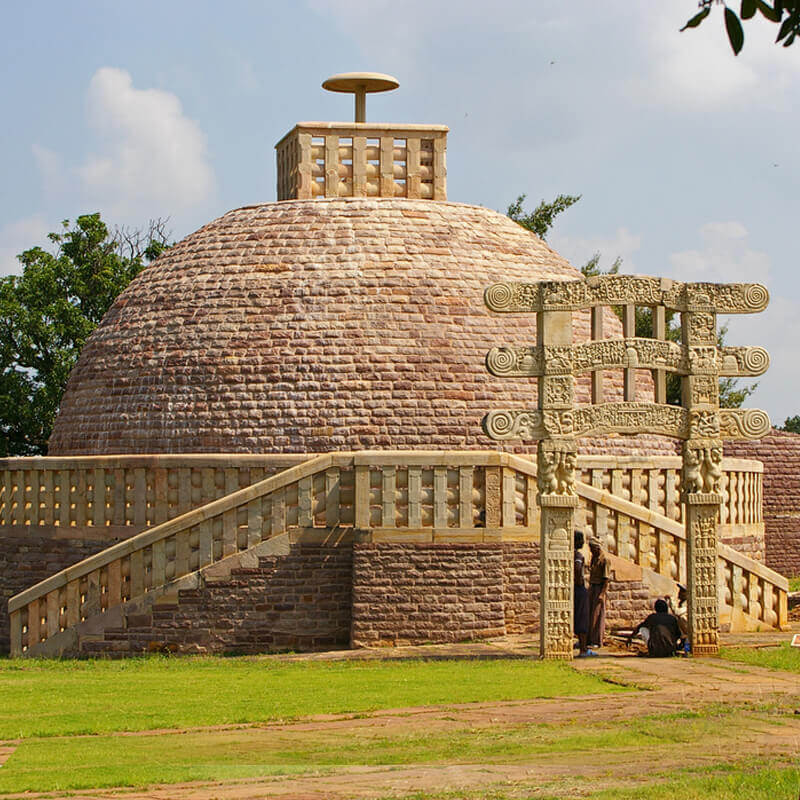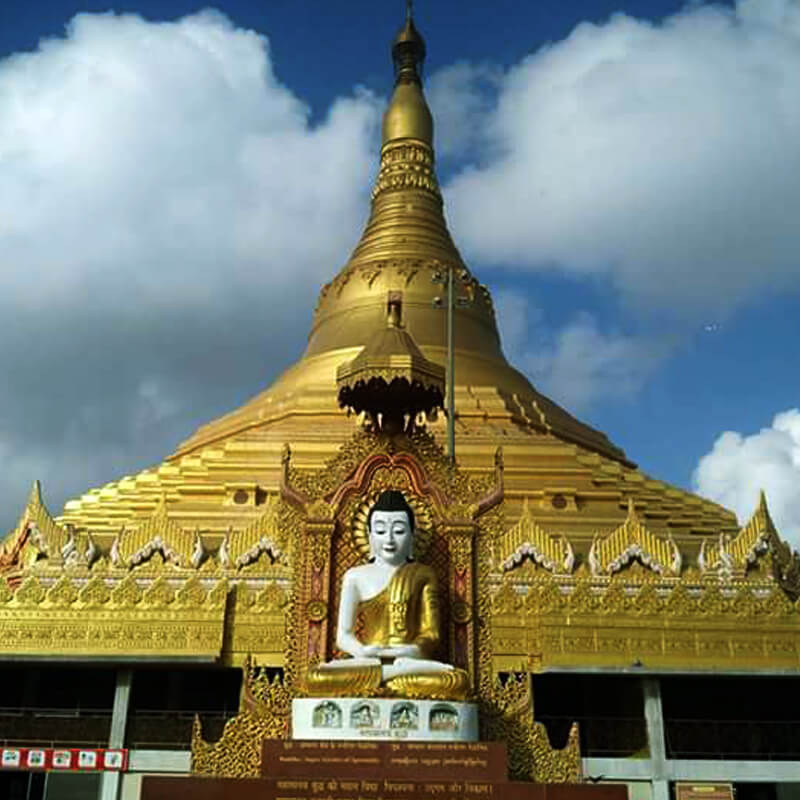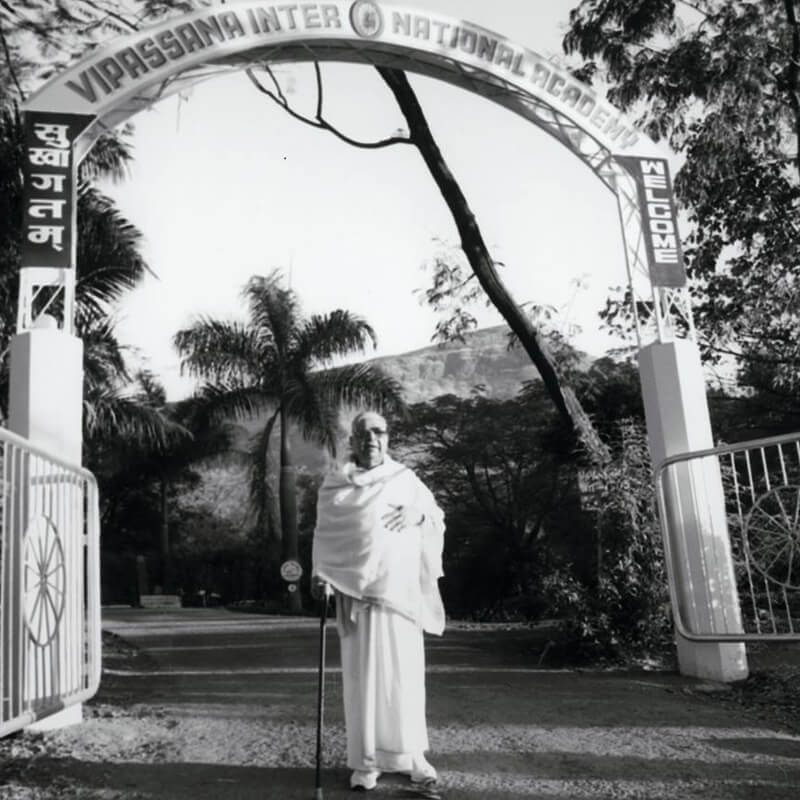Day One, April 10, Vipassana Centre, Hereford, U.K. Island of Dhamma
"Jarāpi dukkhā, jarāpi dukkhā. Old age is misery, old age is misery", Goenkaji said as he came out of his car at Dhamma Dīpa, the Vipassana Centre in Hereford, which was the first stop of his gruelling four month tour of the West. He didn't look miserable though. He was smiling. And before others could ask him about his journey he asked those waiting to welcome him to the centre, "Are you all happy?" He answered himself, "You must be. You are staying on the Island of Dhamma-Dhamma Dīpa."
Goenkaji and Mataji had been travelling for more than sixteen hours before they arrived at Dhamma Dīpa.
Day Two, April 11, Vipassana Centre, Hereford, U.K. Monuments of Dhamma
It was a cold but sunny day in the U.K. Many meditators and their families met with Goenkaji in the afternoon. The early spring at Dhamma Dīpa had produced full blooms on both of the twin cherry trees in front of the female dormitory.
In his concluding address to the annual meeting of the assistant teachers of Europe, Goenkaji said, "All of you are representatives of Dhamma. People will look at your life to judge Vipassana.
"Two qualities are rare in human beings: pubbakārī (those who serve others selflessly) and kataññū, katavedi (grateful).
"Pubbakārī-helping others without expecting anything in return; without expecting money or name or fame. You are here to serve others.
"Sometimes, you may not expect money or name or fame but you expect respect. Or you develop arrogance. This is very harmful for you.
"A branch of a tree that bears fruit comes down because of the weight of the fruit. Similarly a person who develops paññā (wisdom) becomes more humble.
"You got this technique because the Buddha discovered it after developing so many pāramīs over such a long time; because the Sangha preserved it in its purity through the millennia in Myanmar; and because Sayagyi U Ba Khin, my teacher, had such a strong volition that Vipassana should go to India and then spread around the world.
"I expressed my doubt to my teacher after he asked me to teach Dhamma in India, 'Sir, how can an ordinary householder like me, an ordinary businessman, teach Dhamma? And that too in a country where hardly anybody knows me?' Sayagyi U Ba Khin laughed aloud and said, 'Don't worry. You are not going, I am going.' Since my first course every time I teach Anapana, I start by saying, 'O teacher, I am teaching Dhamma on your behalf'. Again when I teach Vipassana, I say 'I am giving Dhamma as your representative'. You all are also representatives of Sayagyi U Ba Khin.
"I started the Global Pagoda project in Mumbai in India not only to have a huge meditation hall alongwith an educational display but also as a memorial to the Buddha, as a symbol of gratitude to Myanmar, as a symbol of gratitude to Sayagyi U Ba Khin. The pagoda will also play an educational role and help in informing people of the truth about the Buddha for centuries.
"The Buddha said, "Sukhā saṇghassa sāmaggī, samaggānaṃ tapo sukho. It is happiness when meditators gather together and happiness it is when they meditate together. You are all meditating together here-such great happiness. The Global Pagoda will provide this opportunity to thousands of meditators.
"More importantly, you should all understand that each one of you is a monument of Dhamma. Each one of you is a memorial to Sayagyi U Ba Khin. Every single meditator is a memorial. Each meditator should become a lighthouse of Dhamma. This will happen only when you apply Dhamma in life."
Day Three, April 12, Vipassana Centre, Hereford, U.K.
The Child and the Charcoal
Goenkaji was interviewed in the morning by the local BBC Radio station and then by BBC World Service Radio. Following these interviews, he spent the rest of the day meeting individual meditators, trusts and assistant teachers.
In the evening, he gave a public talk at the Shire Hall in St. Peter's Square in the nearby town of Hereford. The hall was filled to capacity and meditators were asked to go to an adjacent room in order to make space for non-meditators (those who had not yet taken a Vipassana course).
In his talk, Goenkaji explained the simple, universal nature of the technique of Vipassana that benefits one and all by making one aware of what is happening deep inside. He gave the example of a child and burning charcoal. The child out of ignorance feels that the burning coals are red toys. Its mother protects the child by preventing it from approaching them. However, when the mother is not around, the child tries to play with the charcoal. The moment he touches them, he withdraws his hands because they burn him. An ignorant child soon learns that these are burning coals that harm him if he touches them but we grown-up people think of ourselves as very knowledgeable but we still make the same mistake. Out of ignorance we keep on generating defilements such as anger, hatred, fear, jealousy, lust and we keep on burning inside. With the practice of Vipassana we learn to be aware of what happens inside and by repeated observation and awareness, by repeated practice, we learn to eradicate the defilements that burn us.
Local newspaper reporters interviewed Goenkaji after the talk. They were curious to know about this new mental training technique that was taught at a centre in their area.
One reporter asked Goenkaji, "For those who believe in God, it is the God Almighty who is going to give them good qualities; to make them compassionate etc. You, on the other hand, ask the individual to take the responsibility to purify his/her own mind. Why not just pray to God to do it?" Goenkaji smiled and answered, "God helps those who help themselves! Learn to help yourself in the right way by not corrupting your mind and you will find that you are getting help from every direction."
Day Four, April 13, Vipassana Centre, Hereford, U.K.
Mataji's Role
Meditators from all over Europe came to Dhamma Dīpa to join the one-day retreat. Goenkaji gave Vipassana to more than 400 meditators.
This was followed by private interviews with meditators and a couple of journalists.
One of the journalists asked Goenkaji why Mataji willingly accompanies him and helps him on all his arduous journeys. Goenkaji told the journalist that it is because she has benefited and wants to share the benefits with others. She helps in creating a helpful atmosphere by practising mettā while Goenkaji gives a Dhamma talk or answers questions from the audience. Many spiritual gurus have misused their position in the past to exploit their female disciples. Mataji's presence alongside Goenkaji has always inspired confidence in women. Some women in India who don't feel comfortable talking to Goenkaji about their personal problems, due to modesty, go to her. She helps in many other ways. She looks after Goenkaji's needs and assists him. Her presence also helps dispel a deep misconception in the mind of many (especially in India) that the Buddha's teaching is not suitable for householders.
Day Five, April 14, Vipassana Centre, Hereford, U.K.
The Householders and the Monks
The tradition for which Goenkaji carries the torch today is primarily a tradition of householders. Many Vipassana meditators wanted their families to meet Goenkaji and those with young children also wanted their children to meet Goenkaji. On this morning, Goenkaji met the families of Vipassana meditators.
But the big event of the day was a Sangha Dana. The Sangha is the repository of Dhamma. It has kept the Dhamma as a living tradition through the last two millennia. The purity of the teaching, purity maintained by some bhikkhus in a chain of teacher and disciple, has ensured that the teaching has retained its universal application and universal appeal even today. Those who benefit from Vipassana are grateful to the Sangha for that. They also feel respect for the Sangha that has renounced everything to dedicate their lives to practising the Buddha's teaching. Venerable monks were invited to Dhamma Dīpa where they were first served food and then given other requisites. Hundreds of lay people were present to take the opportunity to earn merits by serving the monks.
Goenkaji then spoke to the gathering. In his talk he said he was attracted to the teaching because of his saintly teacher Sayagyi U Ba Khin, because it gives result here and now, because of the non-sectarian nature of the Dhamma, and because he could not find anything objectionable in the teaching of the Buddha.
Day Six, April 15, Vipassana Centre, Hereford, / Birmingham, / London, U.K.
Price for the Priceless Dhamma
When Vipassana started taking roots in U.K., Birmingham had a small but dedicated group of students. Goenkaji accepted an invitation to talk at the University of Birmingham during this tour. He travelled to the University to give a talk at the Avon Room there.
He exhorted the audience as he always does in his discourses to give a trial to this benevolent technique. He said that there is no price for the teaching or for the lodging and board at the Vipassana courses but nevertheless, "You have to pay the price. And the price is: Ten valuable days of your invaluable life!"
It was almost nine when Goenkaji left Birmingham. He arrived in London after midnight. Mrs and Mr Harshadbhai Patel, at whose house he was going to reside during his stay in London, were waiting with their sons to receive Goenkaji and Mataji. It had been another long day.
Day Seven, April 16, London, U.K. Spreading the Word
Today, Goenkaji appeared on the Jimmy Young Show on the BBC. The host was interested in knowing about the effect of Vipassana on prisoners and on professionals. Goenkaji gave a short talk in the studio but many comments and e-mails continued to come in as the show continued.
In the evening he gave a public talk at the Kadwa Patidar Centre in Harrow, London. He had spoken at the same venue during his last visit to U.K. The audience was multiracial and multiethnic. There were many people of Indian origin. Goenkaji spoke for thirty minutes each in English and Hindi.
In these talks, Goenkaji remarked that religion without spirituality is like an empty container; like a lighthouse that has no light. He pointed out that so many conflicts are due to attachment to the outer shell of religion while ignoring the valuable inner core.
Dhamma is a way of learning how not to harm oneself and how not to harm others. It is a way out of misery.
He gave the example of Duryodhana from the story of Mahabharata. Duryodhana used to say, "I know quite well what is right but what to do, I don't have the propensity for it and I know quite well what is wrong but what to do, I have the propensity for it." We are all like Duryodhana. We know at the intellectual level what is right but we still keep on repeating the same mistakes because our mind is not under our control, because it is not pure.
A saint is a saint, whether Muslim, Hindu, Sikh, Christian or Jewish. A Muslim saint of Punjab said, "Unless you know yourself, you cannot know God."
All saints have been teaching people to live a peaceful and happy life. The Buddha gave a practical path to achieve this. Modern science is researching the truth outside. However, the Buddha said that within this fathom-long body you find the truth-the cause of our misery and the way out of misery.
Day Eight, April 17, London, U.K. Be Careful with Dana Money
Goenkaji gave Vipassana on a one-day course at the Kadwa Patidar Hall, London.
He spoke to teachers, trustees, and senior Dhamma workers in the evening. In his talk, he emphasized that we must be careful with expenses at Vipassana centres. Even if a centre gets large donations, we should still be careful with expenses as extravagant expenses in one centre are likely to be copied by other centres. The teachers and trustees should try to develop the essential facilities first. Every trust should try its best to avoid taking loans. One should be more careful with money received in donation than with one's own money.
Day Nine, April 18, London U.K. / New York, U.S.A. Across the Atlantic
Goenkaji and Mataji flew to New York in the morning. They were received by a few meditators at the airport in New York. The members of the party were accommodated in different buildings and it took some time for everyone to settle down for the evening.
Day Ten, April 19, New York, U.S.A. Meeting Organizers
Goenkaji dealt with pending correspondence that had accumulated over the previous fortnight. There were many messages from all over the world to which he responded. In the evening, he gave interviews to organizers of the Spirit in Business Conference and some other meditators. Bennet Miller, a Vipassana meditator and an award winning film-maker who has undertaken to film the tour met briefly with Goenkaji. Eilona Ariel of Karuna Films was also present for the meeting.
Day Eleven, April 20, New York, U.S.A. May All Beings Be Without Fear
A one-day course was organized at Borough of Manhattan College. Hundreds of meditators gathered there on this rainy day for a one-day meditation course. Goenkaji gave Vipassana and then went to visit ground zero in lower Manhattan, which was within a few minutes drive of the venue for the one-day course. Goenkaji practised mettā bhāvanā and chanted (in Hindi), "Isa mahānagara ke sāre prāṇī sukhī surakshita hoya re." (lit. May all beings of this great city be happy and secure.)
Day Twelve, April 21, New York, U.S.A. Spirituality in Business: Modern Change Agents and Their Responsibility
In the morning Goenkaji gave the Keynote speech at Spirit in Business Conference in the Sheraton New York in Manhattan. He first explained what is spirituality and then went on to explain why spirituality is so important for businesspeople. "At one time, kings had the most power and were the biggest influence on society. Now politicians, administrators, and businesspeople have that position. Good and bad qualities percolate from the top. Therefore it is very important that businesspeople live a moral and righteous life, for their own good and for the good of others.
"For a religion, spirituality is a must but for spirituality, organized religion is not a must. Spirituality doesn't require sectarian crutches. But for any religion, a base of spirituality is mandatory. Without it, an organized religion is lifeless. It is like an empty vessel studded with precious stones, which may look beautiful from outside but from which the nectar of spirituality has drained out. It is like a huge magnificent lighthouse engulfed in darkness, without any light within. How can it show the right path to people?
"The Buddha taught how to develop the four sublime qualities of karuṇā, muditā, upekkhā and mettā. When one sees a miserable person, instead of thinking that it's his own doing or his own karma, one generates compassion-karuṇā. When one sees a successful person, instead of developing jealousy one develops sympathetic joy-muditā. When one faces an adverse situation, instead of losing the balance of the mind, one remains calm and equanimous-upekkhā. And one feels selfless love for all beings everywhere-mettā. These are the qualities of a spiritual person.
"Every businessman should try to develop these qualities for his own good as well as for the good of others."
Goenkaji then narrated his own story of how he came in contact with Dhamma and expressed joy that so many from the next generation of business people are showing keen interest in spirituality.
Josh Baran, a renowned publicist, interviewed Goenkaji briefly. He brought up the question of celibacy among the Christian priests and the current media attention on the alleged misbehaviour of priests within the church. Goenkaji said that Vipassana is a tool that has helped many to live a celibate life naturally since Vipassana helps one to face lust without suppressing it or without giving it a free licence; by taking out lust at the root level. Goenkaji said that every Catholic priest should aspire to imbibe the qualities of Jesus in his life-Vipassana is a tool that makes it easy to do so. Later, he gave press interviews in his room. A Dutch Television Station team also interviewed him about Vipassana.
Day Thirteen, April 22, New York, U.S.A. A Businessman's Story
When Goenkaji and Mataji arrived in New York, it was very warm and humid, almost oppressively so. However, the temperature soon started dropping drastically and it became very cold. Goenkaji's residence was close to Central Park and he took his morning walk in the Park in spite of the cold weather.
Later in the day he went to the Sheraton and gave interviews to various media people. In the afternoon he gave a talk on Vipassana and Anapana to the conference participants. The room where he gave the talk was filled to capacity. After talking about Vipassana courses, Goenkaji told his own story-how Dhamma brought so much harmony in his life, how his relations with his workers improved and how he started sharing his profits with them. Vipassana helped him to face the vicissitudes of life. When businesses were nationalized in Myanmar, instead of feeling depressed and dejected, he felt joy that he could now give more time to Dhamma. He came home on the day when the businesses were suddenly nationalized, and started working on an article on Dhamma that he was been writing. He felt carefree. He saw for himself how the biggest loss could not shake him. Dhamma gave him strength to remain unshaken in the face of the vicissitudes of life.
Following his talk, some of his students from the 70's who have started teaching on their own came to pay respect to him. He was happy to see them again and happy at their worldly success.
Day Fourteen, April 23, New York, U.S.A. Spirituality for All
On the last day of the conference, Goenkaji again talked about spirituality in business. He said, "In my part of the world in the past if a natural calamity such as famine etc. befell a state, people would often blame it on the king saying that the subjects have to face adverse consequences because the king was immoral. The king would then undertake to live an upright and righteous life.
"It is said, 'As the king is, so the subjects will be'. Therefore, the leaders of society have a greater responsibility. They also have a greater opportunity to influence other people.
"When I started taking first steps on the path of Dharma, I learned from experience that spirituality is not a domain of any particular class of society. A priest or a labourer; an academician or an illiterate person; a billionaire or a poor person; all could be equally spiritual.
"No other people have to interact with society as much as business people and political leaders. Businessmen have to deal with staff, factory labour, customers, government agencies, etc. As they become more spiritual their behaviour becomes gentler and they start winning over people. Business requires sharp minds able to take quick decisions. When the mind is calm and unperturbed, it takes better decisions.
"Spirituality and good business go hand in hand. Both contribute not only to the well being of owners, shareholders, staff, and customers but, equally important, to the real happiness of the businessman himself.
"A businessman is always in a relentless race to earn more and more money. At some point, he also starts feeling that along with money he must also start earning name and fame. And to fulfil this desire, he or she starts giving money in charity. Such charity cannot give you joy. Giving donations is a sublime art. True charity is done without expecting anything in return. One gives away money or serves others to deflate one's ego, not to inflate one's ego. The whole attitude should be how to serve more and more people. That is all."
(to be continued)






